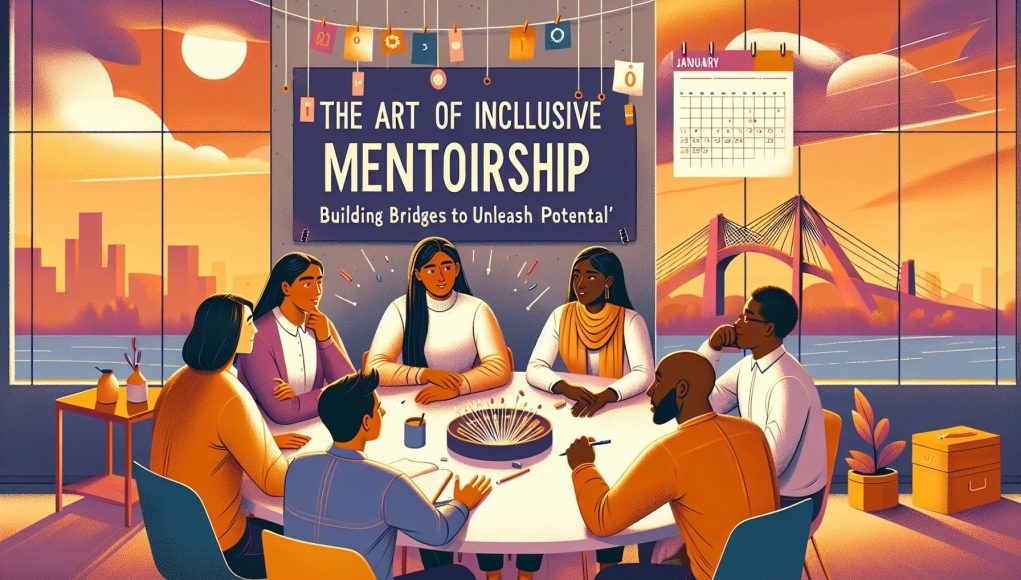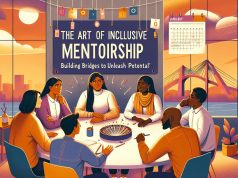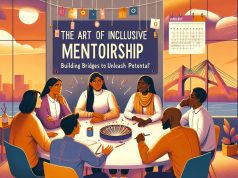The Art of Inclusive Mentorship: Building Bridges to Unleash Potential
In the landscape of professional growth, mentorship has steadfastly been a beacon of guidance, wisdom, and mutual respect. As we celebrate National Mentoring Month, it becomes critical to reimagine this traditional concept through the lens of inclusivity, encouraging not only growth but a vibrant exchange of ideas, experiences, and perspectives.
Inclusive mentorship transcends the boundaries of conventional mentor-mentee relationships. It calls for a mentor-coach dynamican approach that embraces diversity, equity, and accessibility. Unlike traditional mentorship that often follows a top-down model, a mentor-coach fosters an environment where dialogue is cyclical, learning is mutual, and growth is shared.
Understanding the Mentor-Coach Dynamic
The mentor-coach is less about providing answers and more about exploring the questions alongside the mentee. This dynamic advocates for an evolving relationship where both parties actively engage in continuous learning and development. With mentor-coach, the mentor becomes a guide, a strategist, and a collaboratorhelping mentees stretch their potential while understanding their unique challenges and strengths.
In this inclusive space, the power dynamics traditionally associated with mentorship shifts towards a partnership. Mentors not only steer mentees through their professional journeys but also celebrate their individuality, promote their ambitions, and support their professional narratives.
Creating Safe and Inclusive Mentorship Spaces
Creating an inclusive mentorship space is an intentional process. It requires a commitment to understanding and dismantling systemic biases, re-evaluating preconceived notions, and fostering an environment where every voice is heard and valued. Here’s how we can build this inclusive mentoring culture:
- Embrace Diversity: Actively seek to engage with individuals from varied backgrounds, experiences, and perspectives. This not only enriches the mentoring experience but also broadens horizons for both mentor and mentee.
- Encourage Open Dialogue: Establish a culture of trust where mentees feel safe to express their ideas, concerns, and aspirations without the fear of judgment or repercussions.
- Provide Equal Opportunities: Recognize the potential in every individual, offering equal opportunities for growth and development, and actively work to eliminate barriers to accessing these opportunities.
- Continual Feedback: Foster a feedback-rich environment where learning is reciprocal. Consistent, constructive feedback helps both mentors and mentees grow and adapt.
The Impact of Inclusive Mentoring in Professional Spaces
When we cultivate inclusive mentorship spaces, we’re not just paving the way for individual growthwe’re transforming organizational cultures. Inclusive mentoring creates leaders who are empathetic, socially-aware, and more adept at navigating complex, multicultural environments.
Organizations that prioritize inclusive mentor-coach relationships witness enhanced team collaboration, innovation, and retention rates. They create an echo chamber of change, where inclusive values ripple across departments and are ingrained in the very fabric of their culture.
Conclusion
As we honor National Mentoring Month, let us commit to fostering inclusive mentorship spaces that empower all voices and nurture potential. By embracing the mentor-coach dynamic, we celebrate diversity not just in theory but in practice, enriching our professional landscapes and building bridges to unleash human potential. The journey of mentorship is one of learning, leading, and illuminating paths yet unexplored. And in the spirit of inclusivity, may we all become bridge-builders in this transformative journey.




























